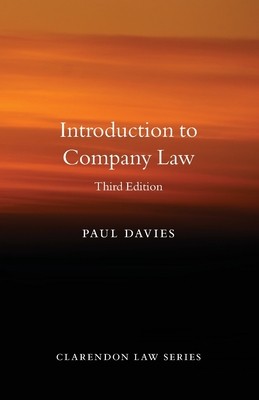
- We will send in 10–14 business days.
- Author: Paul Davies
- Publisher: Oxford University Press, USA
- ISBN-10: 0198854927
- ISBN-13: 9780198854920
- Format: 13.7 x 21.3 x 2.3 cm, minkšti viršeliai
- Language: English
- SAVE -10% with code: EXTRA
Reviews
Description
Since the financial crisis of 2007 to 2009 the role of the company in society, especially the role of publicly traded companies, has acquired a political salience that was largely absent in the decades before the crisis. This concern has been reflected in both enhanced reporting requirements and in the latest version of the Corporate Governance and Stewardship Codes applicable to the largest companies.
This books analyses these developments in full, as well as the more fundamental proposals for reform of corporate law that have been advanced outside official circles. The book also examines the functions of the five core features of company law-separate legal personality, limited liability, centralized management, shareholder control, and transferability of shares. It finally analyses the legal strategies available for moderating the frictions that these core features nevertheless generate for those providing the necessary inputs for a company's business. Written by one of the field's foremost experts, Paul Davies' Introduction to Company Law provides a comprehensive conceptual introduction to the subject, giving readers a clear framework with which to navigate the intricacies of company law.EXTRA 10 % discount with code: EXTRA
The promotion ends in 23d.21:17:30
The discount code is valid when purchasing from 10 €. Discounts do not stack.
- Author: Paul Davies
- Publisher: Oxford University Press, USA
- ISBN-10: 0198854927
- ISBN-13: 9780198854920
- Format: 13.7 x 21.3 x 2.3 cm, minkšti viršeliai
- Language: English English
Since the financial crisis of 2007 to 2009 the role of the company in society, especially the role of publicly traded companies, has acquired a political salience that was largely absent in the decades before the crisis. This concern has been reflected in both enhanced reporting requirements and in the latest version of the Corporate Governance and Stewardship Codes applicable to the largest companies.
This books analyses these developments in full, as well as the more fundamental proposals for reform of corporate law that have been advanced outside official circles. The book also examines the functions of the five core features of company law-separate legal personality, limited liability, centralized management, shareholder control, and transferability of shares. It finally analyses the legal strategies available for moderating the frictions that these core features nevertheless generate for those providing the necessary inputs for a company's business. Written by one of the field's foremost experts, Paul Davies' Introduction to Company Law provides a comprehensive conceptual introduction to the subject, giving readers a clear framework with which to navigate the intricacies of company law.

Reviews